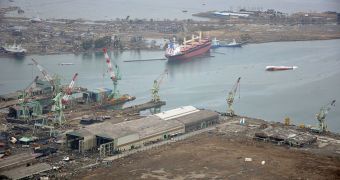March 11, 2011 is a date that marked the beginning of a type of crisis that Japan hasn't experienced since World War II. The population living in the tsunami- or earthquake-affected areas is starting to experience the effects of food insecurity, most of them for the first time in their lives.
This effect is largely overlooked by analysts, who prefer to focus their attention on the more pressing matters, such as the state of nuclear reactors at Fukushima Daiichi, cleaning up tsunami debris, or rebuilding structures knocked down by the tremor.
But there are usually side-effects to earthquakes that do not become visible right away. One of them is relapsing depression among the general population, whereas another is food insecurity – precisely the thing taking place in Japan now.
The issue has many angles, experts say. For starters, certain types of foods are very scarce, and can readily be found only in larger cities. The areas worst-affected by the tsunamis, such as Miyagi and Fukushima prefectures, have it much worse off.
In all fairness, some of the food shortage that is apparent there was caused by increasing demand, as panicked people began stocking up on basic foods such as milk, rice and bottled water.
On the other hand, more “sophisticated” foods such as soybeans, yogurt and miso can no longer be found in Eastern Japan. All major producers had facilities based in Tohoku, and all of these installations suffered damaged from the earthquake and subsequent tsunami.
But food unavailability has recently been surpassed by the threat of radioactive contamination, especially for the communities living within 80 kilometers or so of Fukushima's nuclear reactors.
People living in the Japanese capital Tokyo (about 36 million of them) are heavily dependent on fruits vegetables and fish imported from surrounding prefectures, including Fukushima. Given the fact that the four reactors leaked radiation in the air, imports have been ceased immediately after the tremor.
Farmers and animal growers in the evacuated area will take a terrible economic blow, as will Japan as a whole. After taking decades to build its fame as the leading restaurant capital of the world, the tsunami managed to wipe the world's confidence in Japanese cuisine in a matter of minutes.
Tourists are for example worried about consuming fish captured in Japan, even if fishing boats capture it from areas that are nowhere near Fukushima, or the tsunami site. All of this is contributing to harming the country's economy, which was already devastated by the earthquake.
With more than 10,000 farms destroyed by the tsunami, the level of food security in Japan is now at 40 percent, with the gap being filled by produce imported from China, Thailand and the United States.
Governmental policy changes are now the only means of increasing food security, analysts believe. As a brand, Fukushima is probably doomed for the next few decades, similar to how Chernobyl is even today, Our World reports.

 14 DAY TRIAL //
14 DAY TRIAL //